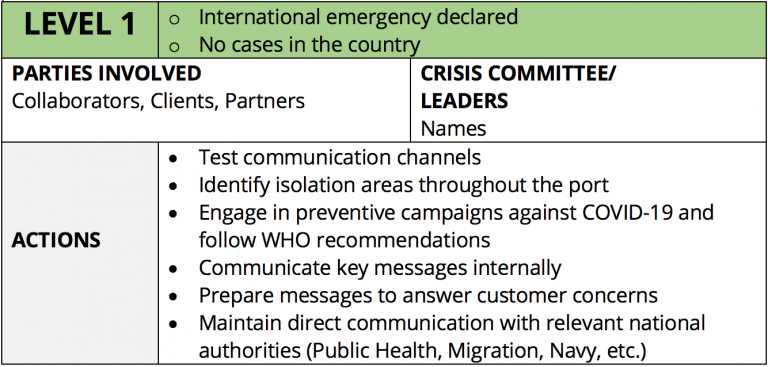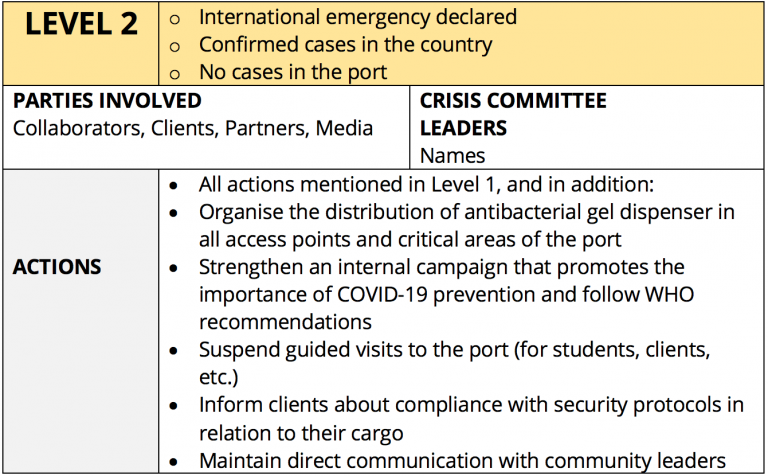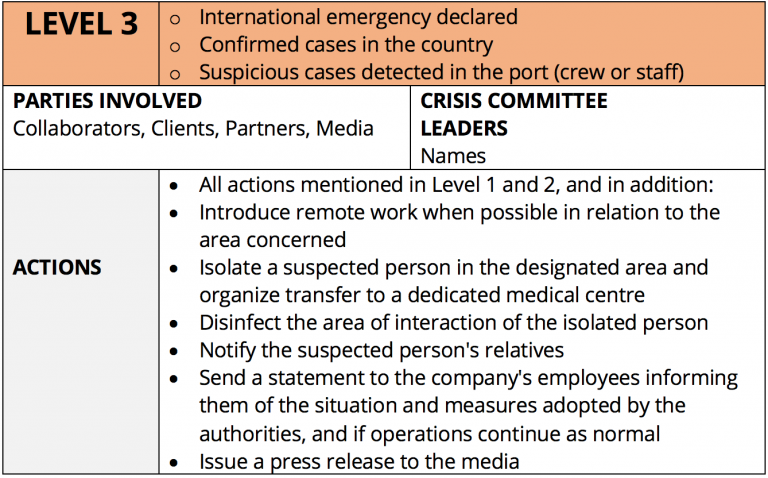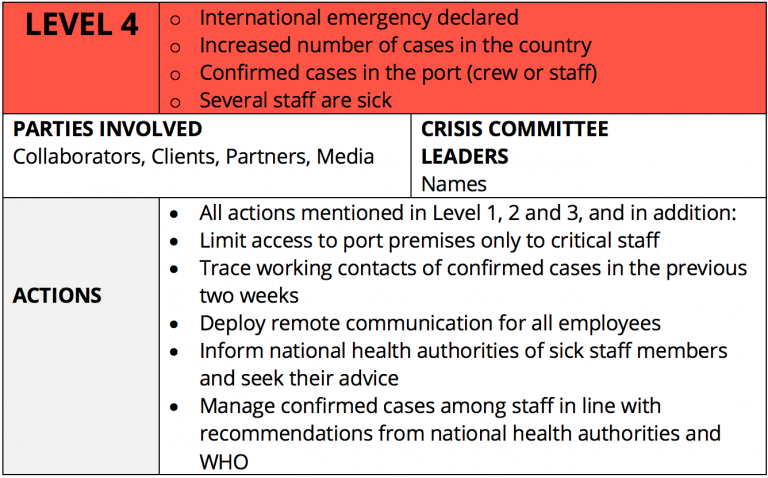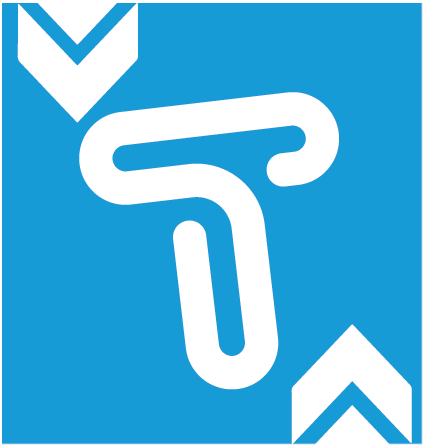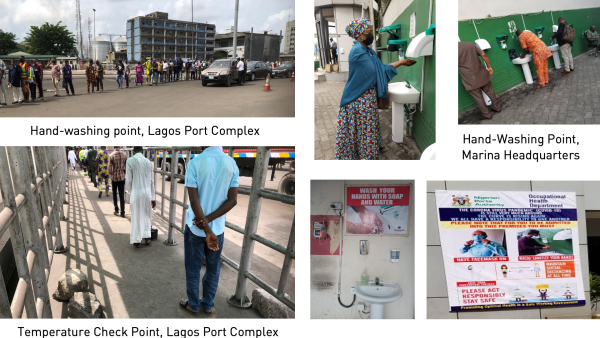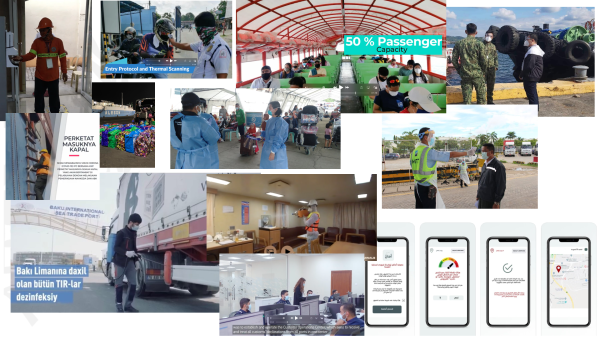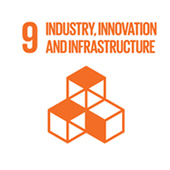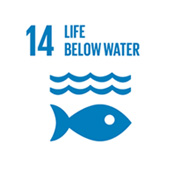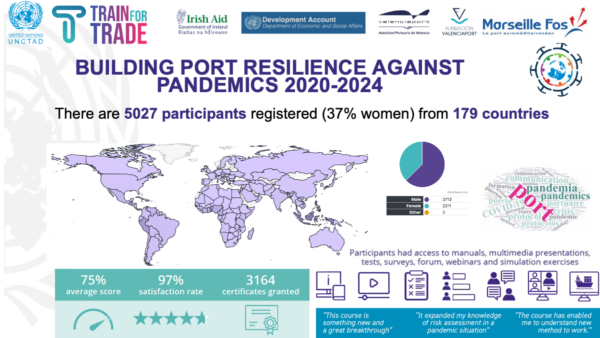
Do you want to play de simulation games?
Simulation exercise: Be the captain in this uncertain time! (15 minutes)
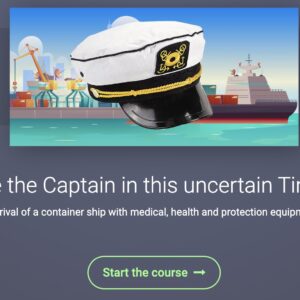
Simulation exercise 2: Are you pandemic-ready? (15 minutes)
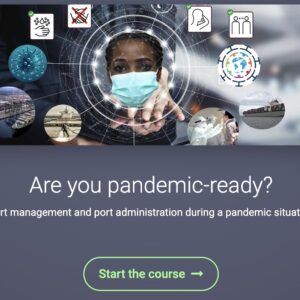
Course Description
This is an asynchronous/self-paced moderated online course that is delivered over a period of two weeks, and followed by two simulation exercises and a webinar (see agenda below for more details). Port experts will engage with participants online in the forum discussions for each of the course sections. The estimated time needed to complete the course activities is about 20 hours.
The online moderated course is structured in four sections, giving a precise and ordered view of the different aspects to be taken into account by a port or port organisation in a pandemic situation. It considers both a general vision and specific actions, the psychological and emotional part related to workers, the technological tools, and also considers actions related to ensuring the main activity of a port in the management of the flow of goods:
Course Details
Key Characteristics
| Dates | Next course is will be held from 19 February to 11 March 2024 |
| Activities | 2 weeks asynchronous moderated online course, 2 self-paced simulations exercises (30-45 minutes), 1 webinar (90 minutes) |
| Number of hours | 20 hours |
| Language | English, French and Spanish |
| Course platform | https://learn.unctad.org/ |
| Registration | All interested participants should register themselves at https://tft-reg.unctad.org/ by 16 February 2024 using the passcode corresponding to the language chosen: English: BPR2024EN French: BPR2024FR Spanish: BPR2024ES |
| Completion criteria | Average score from the 2 quizzes (on Sections 1-4) of at least 50% |
| Certificate | Yes – Electronic certificate |
| Price | Free of charge [1] |
[1] This course is financially supported by the United Nations Development Account and Irish Aid with the suport of Valencia Port, Spain and Marseille Fos Port, France.
Target Population
This special course is addressed to all actors involved in international trade, especially those involved with port operations. The course primary and secondary target population are representatives from the following organisations:
Primary target:
Secondary target:
Objective
The objective of UNCTAD TrainForTrade’s Building Port Resilience Against Pandemics (BPR) special course is to support the implementation of measures and to prepare for and alleviate contingencies related to a pandemic in a port, port terminals, and other seaport actors.
More specifically, at the end of the course, participants will be able to:
Course Structure
This is an asynchronous/self-paced moderated online course that is delivered over a period of two weeks, and followed by two simulation exercises and a webinar (see agenda for more details). Port experts will engage with participants online in the forum discussions for each of the course sections. The estimated time needed to complete the course activities is about 20 hours.
Online course
The online moderated course is structured in four sections, giving a precise and ordered view of the different aspects to be taken into account by a port or port organisation in a pandemic situation. It considers both a general vision and specific actions, the psychological and emotional part related to workers, the technological tools, and also considers actions related to ensuring the main activity of a port in the management of the flow of goods:
Webinar
At the end of the course delivery, participants will be invited to a 90-minute webinar (exact time to be confirmed). The objective of this activity is to discuss issues, present best practices, and brainstorm on policy recommendations.
Simulation exercises/Gamification
During the third week, participants will complete simulation exercises to consolidate the knowledge they acquired during the course. The main purpose of these exercises is for participants to test their decision-making skills in a role play situation as a decision maker in a pandemic context. The estimated time to complete the exercises is about 30-45 minutes. The results are only indicative and will not count in their final grade for the course.
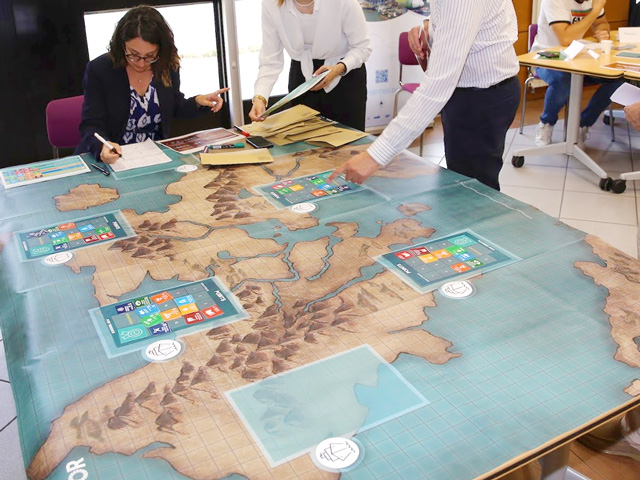
Pictures shared by participants during the 2021 course
There are 809 participants registered (36% women) from 96 countries. Over 1200 posts in the fora. 261 policy recommendations shared, 1000+ votes
“The course was very useful and interesting. I learnt a lot about how to develop mitigation plan related to pandemic disruption in broader view.”
“The materials based on examples in several ports are fit to be implemented in most ports. We could share our views and have other participants opinions and suggestions easily.”
“The learning method is interesting also, especially the simulation exercises.”
“This course helped me to appreciate the idea of establishing a Crisis Response Team in our office.”
From the Golden Book
Pictures shared by participants during the 2022 course
There are 1000 participants registered (36% women) from 112 countries. Over 1200 posts in the fora. 261 policy recommendations shared, 1000+ votes
Webinar video 27 July 2021

Webinar video 27 July 2021
Building Port Resilience Presentation

Building Port Resilience
Presentation
e-DACUM : Design of the Course Curriculum
The purpose of the phase from the TrainForTrade methodology called Design a Curriculum (DACUM), is to brainstorm on the subject of the new course being designed, i.e. “Port resilience against pandemics”. The goals are to define the objectives and content of job aids to be developed, write training objectives, define target population, and describe what the trainees would be able to do as a result of the training. Furthermore, the DACUM proposes how to design tests for each objective and how to finally sequence the objectives and group them into modules to form a curriculum. The DACUM process for this special course was held virtually for the first time and during three 75-minute sessions via Microsoft Teams and with the use of Padlet platforms.

Building Port Resilience Against Pandemics
Background of the Project
In the current times of the global pandemic, various United Nations entities combined their efforts to propose a joint project that will implement standards, guidelines, metrics, tools and methodologies to immediately help governments, including Customs and other border agencies, port authorities, and the business community worldwide, to keep transport networks and borders operational to facilitate the flow of goods and services, while containing the further spread of the COVID-19 virus. One of its components focuses on port resilience against invisible threats and on keeping ports safe and operational during pandemics.
TrainForTrade’s project includes the exchange of best practices and new safety standards and the design and delivery of a training package to build essential skills for port community managers to help protect people and secure vital trade in ports (TFT Special Course “Building Port Resilience Against Pandemics”).
SDGs related to this project:
Support:
This project is financed by the United Nations Development Account Tranche 13 (COVID-19) and Irish Aid.


Ports in the Fight against COVID-19
INTRODUCTION
In the current unprecedented times of a global threat posed by a coronavirus pandemic that has triggered dire consequences for whole societies and nations, the maritime industry is playing an essential role in the response. Around 80% of global trade is transported by commercial shipping. This includes currently most-needed items such as vital medical supplies and equipment, as well as food, energy, raw materials and manufactured goods and components. These are essential for addressing people’s basic needs and for preserving many jobs in manufacturing, maintaining international trade and, in the end, sustaining the global economy.
In view of this, it is important to keep supply chains open and to allow maritime trade to continue. This requires that the world’s ports remain open for ship calls and that ship crews’ changeover is allowed. Further, in these challenging times, some additional measures should be undertaken to protect the staff working in port communities and to ensure continuity of ports’ operations.
BEST PRACTICES
Based on several documents received from ports that are part of the UNCTAD TrainForTrade Network, the following measures have been implemented/observed and could serve as generic guidelines:
(1) Under the International Labour Organization’s (ILO) Maritime Labour Convention of 2006, flag States must ensure that all seafarers on ships flying their flag are covered by adequate measures for the protection of their health and that they have access to prompt and adequate medical care whilst working onboard. The Convention also requires port States to ensure that seafarers on board ships in their territory who are in need of immediate medical care are given access to medical facilities onshore.
RECOMMENDATIONS
It is crucial to keep the country’s borders open for all forms of freight transport, in particular ports considered to be essential national assets. Governments need to ensure that health measures are implemented in ways that minimize unnecessary interference with international traffic and trade; in particular, by respecting the requirements of “free pratique” for ships under the International Health Regulations (IHR). The principles of avoiding unnecessary restrictions or delay in port entry for ships, persons and property on board are also embodied in articles I and V and section 6 of the annex of the Convention of the Facilitation of Maritime Traffic (FAL Convention). This is underscored by the International Labor Organisation (ILO) and the International Maritime Organisation (IMO).
The way forward
As ports moved forward to win the battle against this pandemic, several milestones needed to be achieved:
- Boost Internet capabilities and accessibility inside and outside port areas for port workers and users alike. Connectivity as mentioned by the World Bank Group is a “public good” after all;
- Increase connectivity and data interoperability in Global Supply Chains by implementing Port Community Systems and taking advantage of Digital Ledger Technology the likes of Blockchain as promoted by the World Economic Forum (WEF);
- Develop shorter and more diversified supply chains supported by advanced automation and labor-protective relocations in line with climate change objectives;
- Reinforce port regional cooperation to build more resilient trade nodes to brace for future COVID-19 pandemic-like shocks;
- Design new policies for resilient and inclusive ports to reach out to the most vulnerable people who are often dependent on the port communities’ economic and social fabric; and
- Engage in innovative training approaches and well-being at all-staff levels leveraging on the technology.
Lastly, thanks to the support of the United Nations Development Account (https://www.un.org/development/desa/da/da-response-to-covid-19/) and following requests from port members, UNCTAD engaged in the development of a TRAINFORTRADE training and capacity building package called “Building Port Resilience Against Pandemics” (BPR) that will be made available to port communities around the world.
The structure of this BPR course has been defined during eBrainstorming sessions in May and June 2020 with port experts from the Dominican Republic, Ghana, Nigeria, Malaysia, Indonesia, Ireland, Spain, Brazil, Greece and the IAPH Secretariat.
Crisis Protocol
The following section presents an example of a crisis protocol that can be used as a guide on actions that should be implemented in relation to strictly defined crisis levels.
